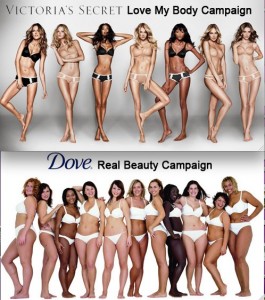In our society, there has always a been an ongoing debate about the way women are depicted in advertisements. Most ads exhibit the ‘ideal woman’ to be very slender such as in Victorias Secret advertisements, which give the message that only skinny women are seen as beautiful. There has been a new trend for brands such as Dove to use plus sized models in their advertisements and escape the usual tendency for ads to feature skinny women. Irina Costei raised the discussion of how both the Dove and Victorias Secret commercials are on opposite ends of the spectrum, featuring only skinny or only plus sized models, without any diversity in between. I agree with Irina Costei that Dove’s marketing is equally as flawed as Victorias Secret’s as it has the same effect on people. Bigger women who look at Victorias Secret’s adds may not think they are beautiful enough to buy Victoria’s secret products and vise versa with the Dove commercials. I believe that Dove’s new advertising campaign is a step in the right direction for advertisements pertaining to women’s body image, however the first brand to feature both skinny and plus sized models simultaneously will earn a lot of respect from consumers and appeal to a wider range of customers as well.

Sources:
https://blogs.ubc.ca/irinacostei/2012/09/29/dove-vs-victorias-secret-raises-body-image-debate/
